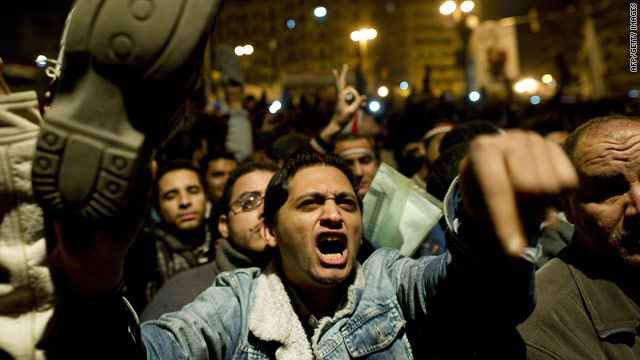
Protesters in Cairo's Tahrir Square erupt in anger after President Hosni Mubarak indicates he will not resign.
02:09 AM ET
The latest developments, as confirmed by CNN, on the uprising in Egypt. Demonstrators have taken to the streets of Egypt's major cities to demand an end to President Hosni Mubarak's 30-year rule, prompting the government to deploy the military to deal with civil unrest for the first time in a generation. Check out our full coverage and the latest tweets from CNN correspondents on the ground.
[Update 8:02 a.m. Friday in Cairo, 1:02 a.m. Friday ET] Anti-government chants rang out in Cairo's Tahrir Square as protesters streamed in Friday morning for an 18th day of demonstrations demanding Egyptian President Hosni Mubarak's resignation. Troops and tanks stood guard as protesters continued calls for an end to the leader's nearly 30-year rule.
[Update 6:22 a.m. Friday in Cairo, 11:22 p.m. Thursday ET] More large anti-government protests are expected Friday in Cairo, Alexandria and elsewhere in Egypt, despite Mubarak's announcement late Thursday that he'd delegate his powers to Vice President Omar Suleiman.
[Update 6:20 a.m. Friday in Cairo, 11:20 p.m. Thursday ET] U.N. Secretary-General Ban Ki-moon said in a statement late Thursday that the United Nations "stands ready to assist" in the process of ensuring "genuine and inclusive dialogue with all stakeholders" in order to expedite a "transparent, orderly and peaceful transition that meets the legitimate aspirations of the Egyptian people."
[Update 4:29 a.m. in Cairo, 9:29 p.m. ET] - Following Mubarak's Thursday night speech, thousands of demonstrators in Cairo's Tahrir Square have been showing their defiance to his rule by lying down on the streets and sidewalks under blankets for a massive "sleep in." On one wide sidewalk, about a hundred protesters lay next to each other under blankets.
Meanwhile, a group of volunteers were working early Friday to construct makeshift homes and buildings in the square, using plywood and wooden boards. They included shower stalls and bathrooms, activist Sharif Makawi said.
[Update 3:30 a.m. in Cairo, 8:30 p.m. ET] Long a pillar of Hosni Mubarak's three-decade rule over Egypt, Omar Suleiman now sits at the top of the pyramid as its de facto president. Read more about Suleiman and his gradual rise to the top.
Brush up on Mubarak's speech here and find Suleiman's speech here.
Update 3:00 a.m. in Cairo, 8:00 p.m. ET] U.S. President Barack Obama urged the Egyptian government "to move swiftly to explain the changes that have been made, and to spell out in clear and unambiguous language" the process that will lead to democracy.
"The Egyptian people have been told that there was a transition of authority, but it is not yet clear that this transition is immediate, meaningful or sufficient. Too many Egyptians remain unconvinced that the government is serious about a genuine transition to democracy, and it is the responsibility of the government to speak clearly to the Egyptian people and the world," he said in a statement. "The Egyptian government must put forward a credible, concrete and unequivocal path toward genuine democracy, and they have not yet seized that opportunity."
Obama did not call on Mubarak to step down, but he did call for emergency law to be lifted while negotiations continue among the government, opposition parties and civil society on the country's future.
